Examining the Book of Lamentations
Mike Ervin

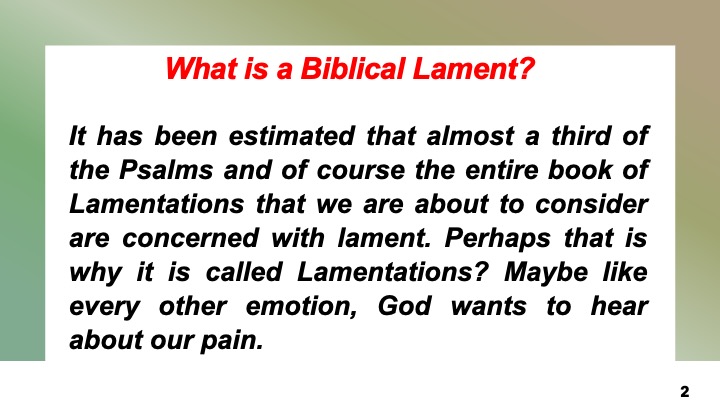
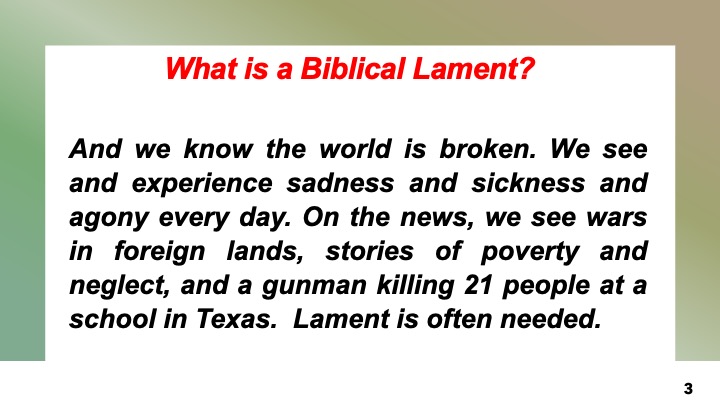
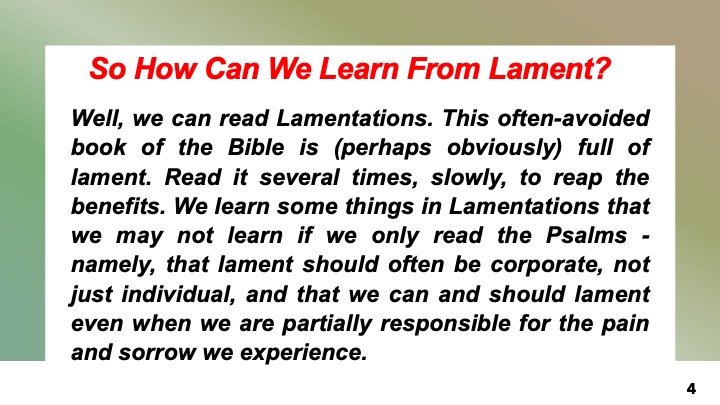
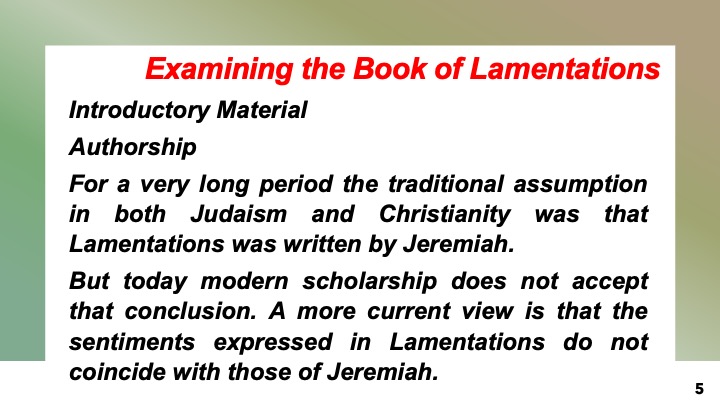
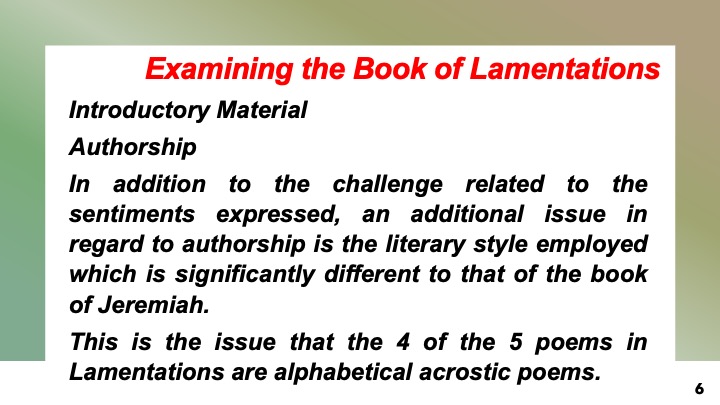

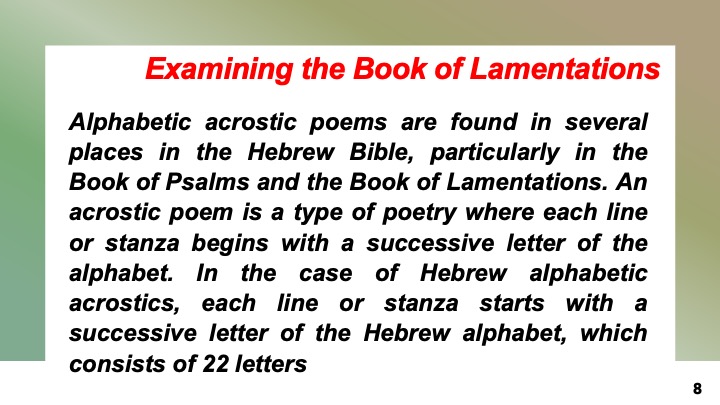
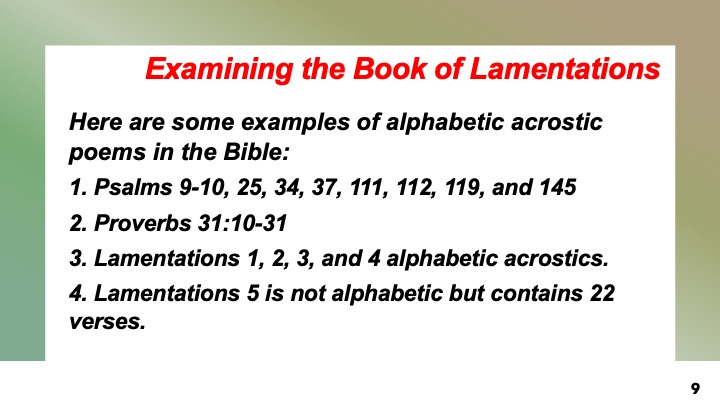
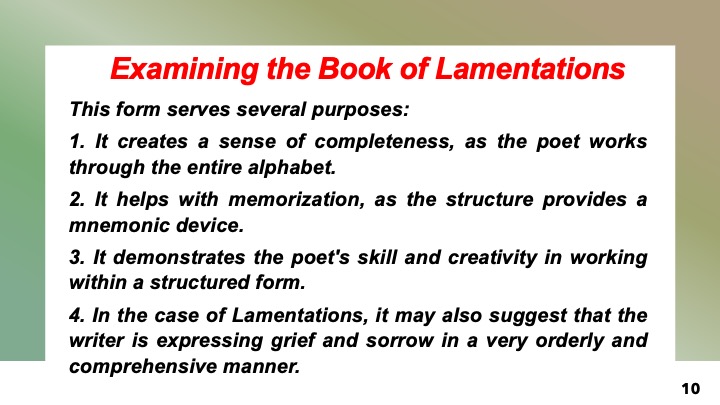
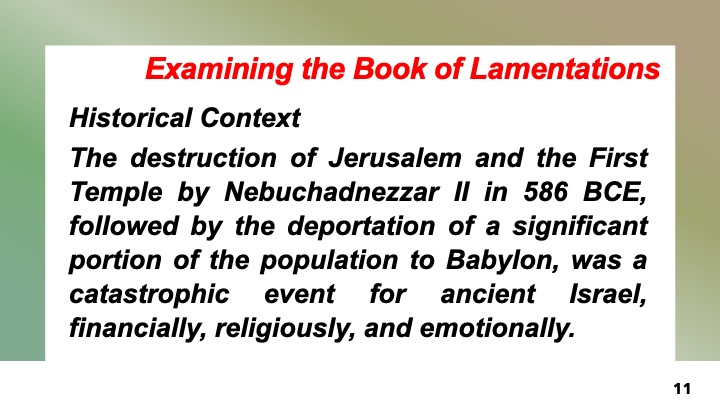
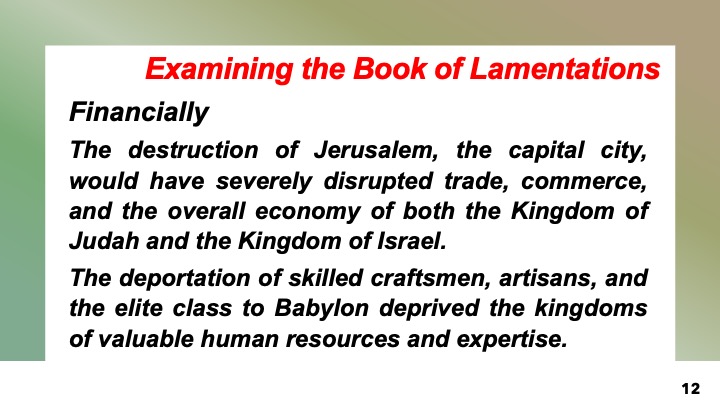
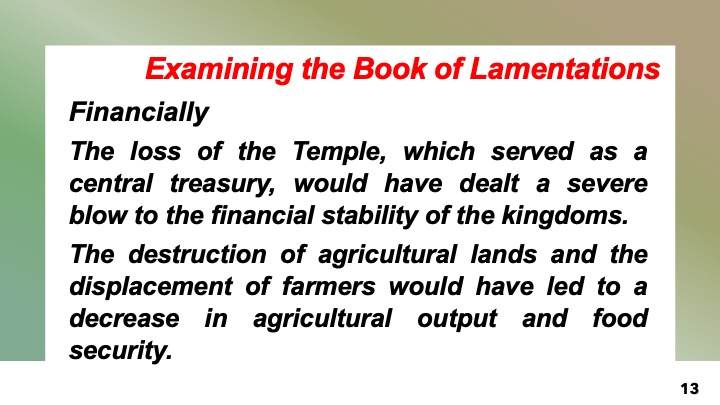
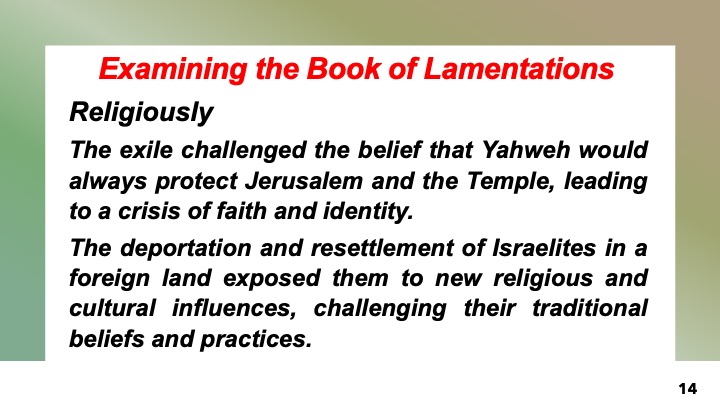
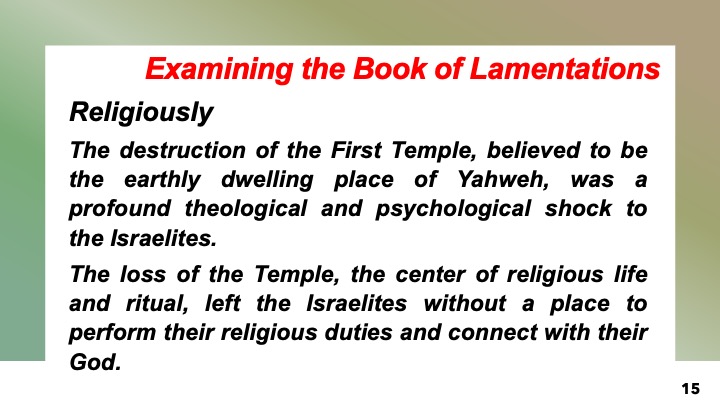
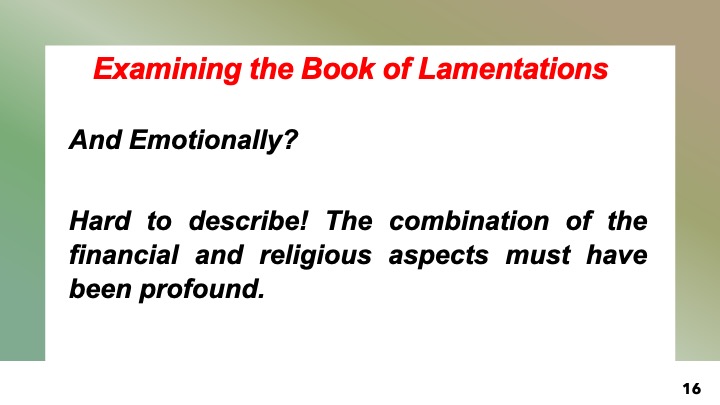
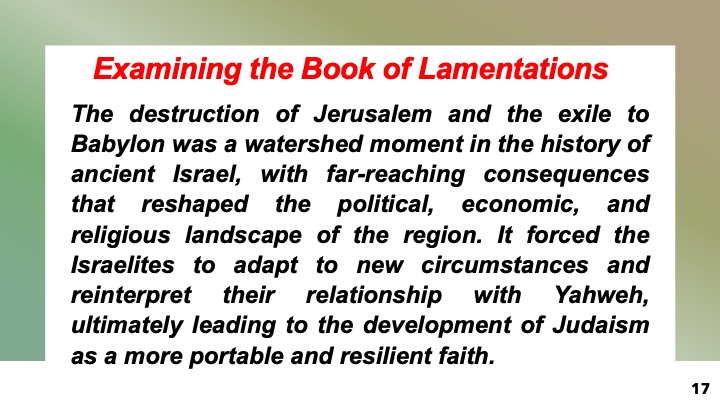
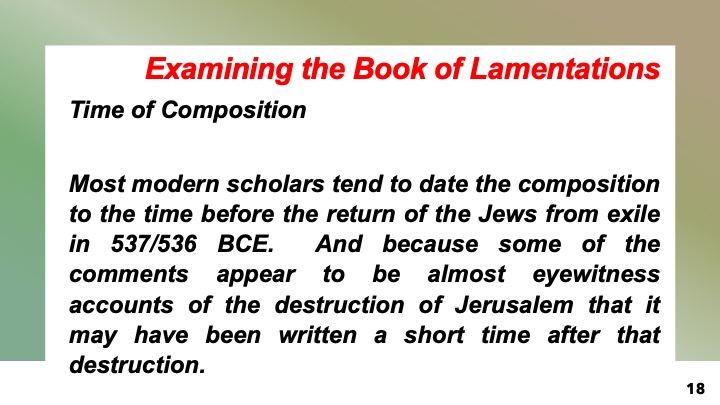
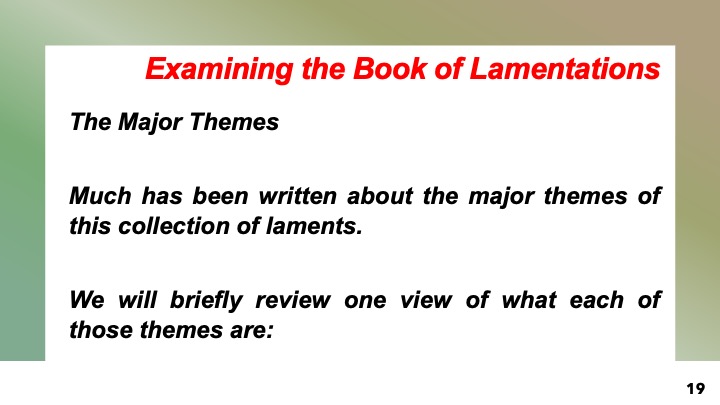
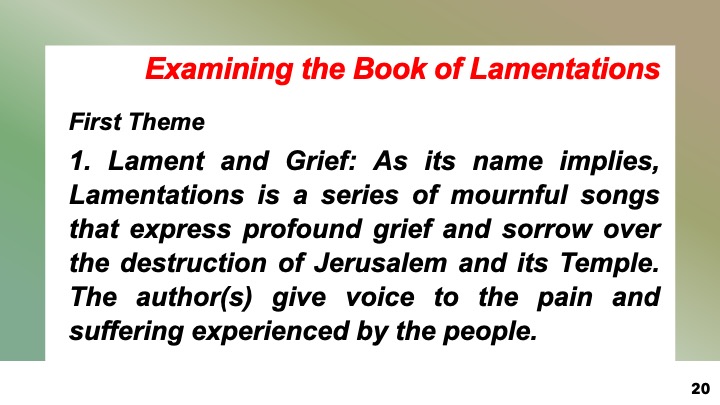
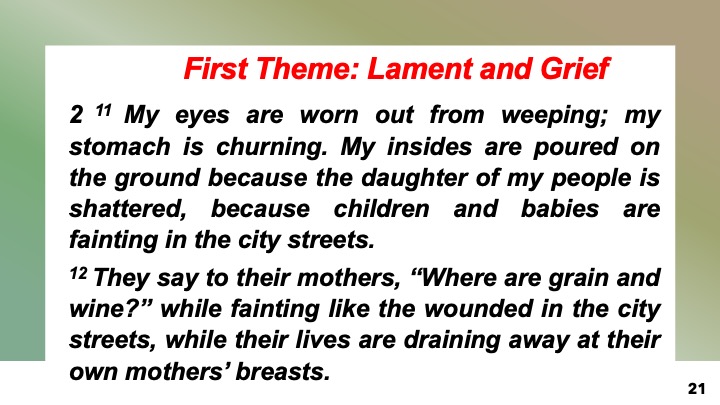
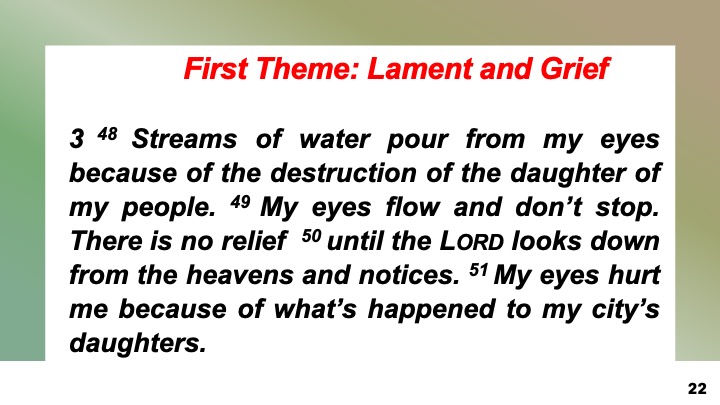
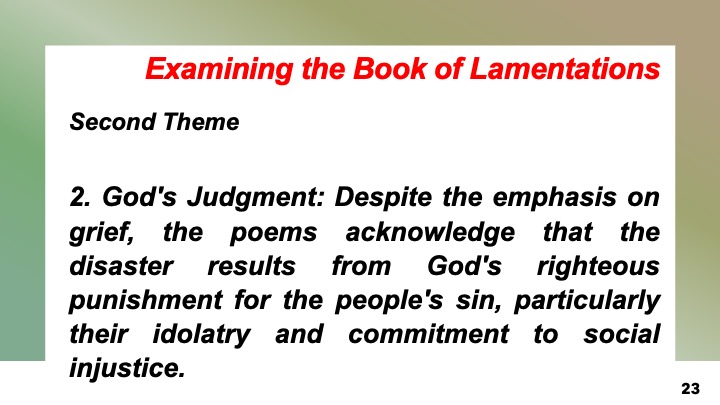
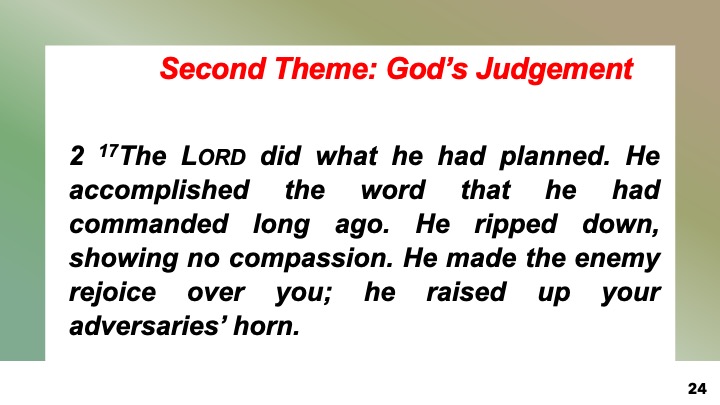
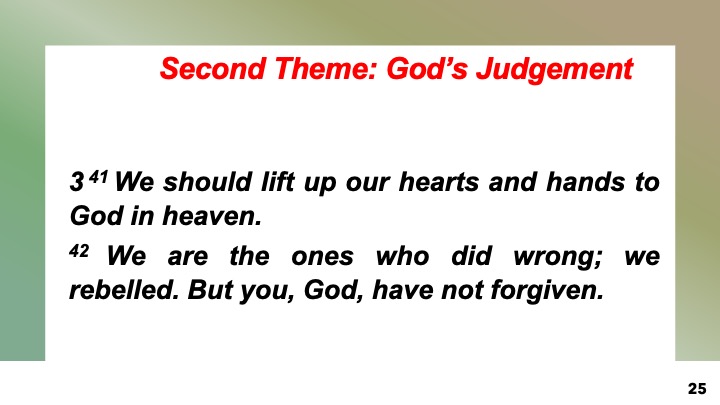
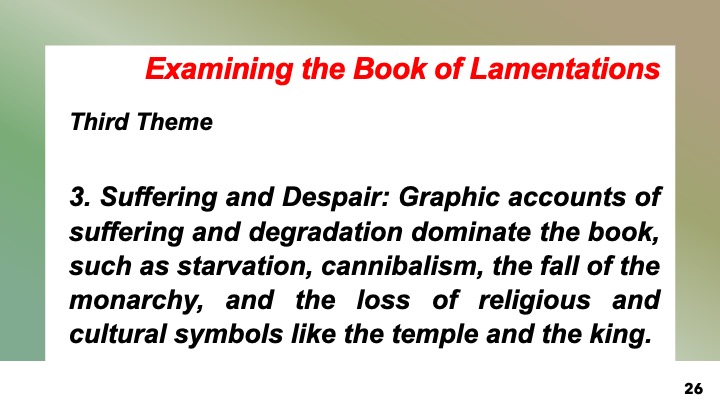
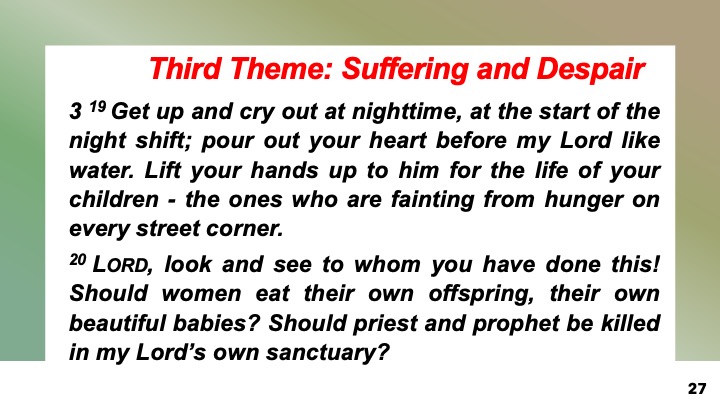
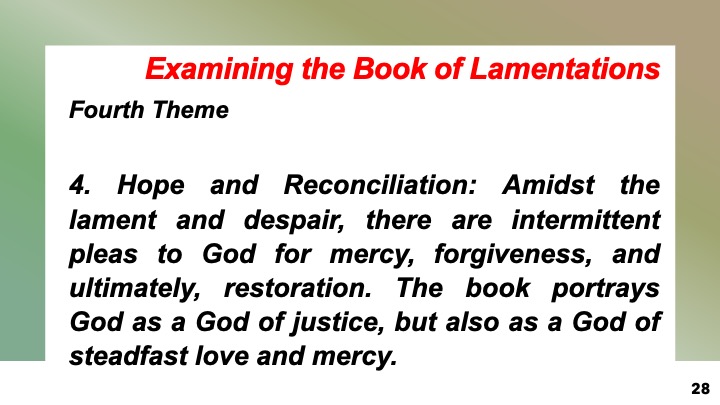
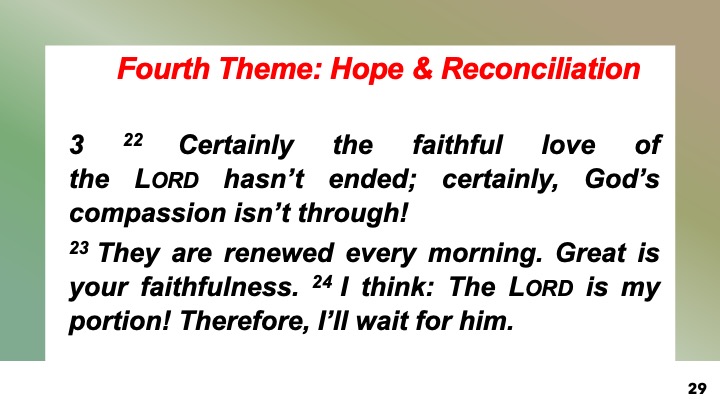
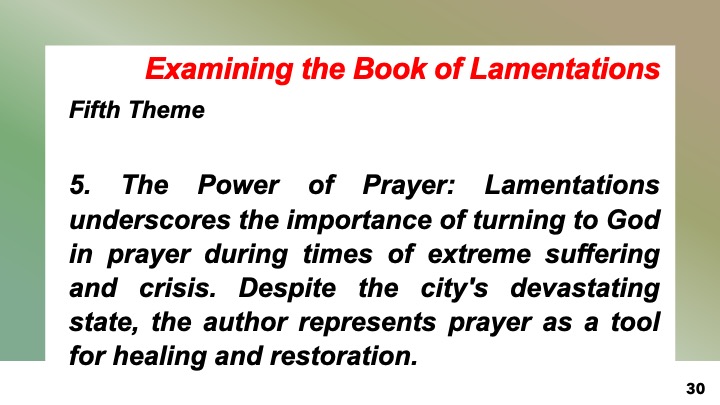
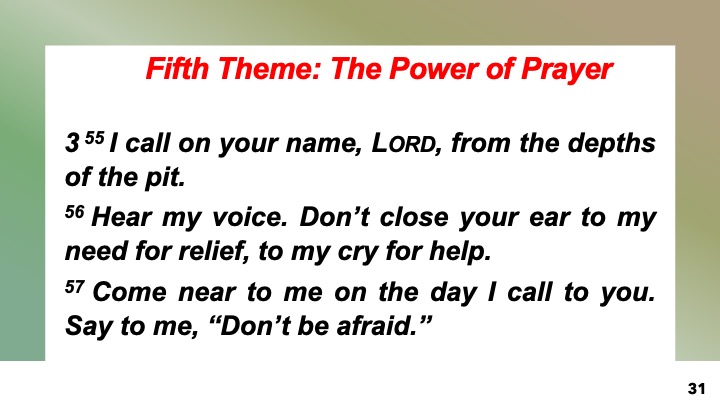
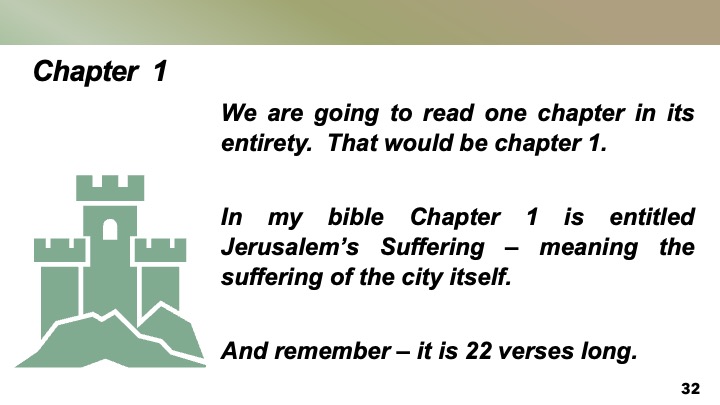
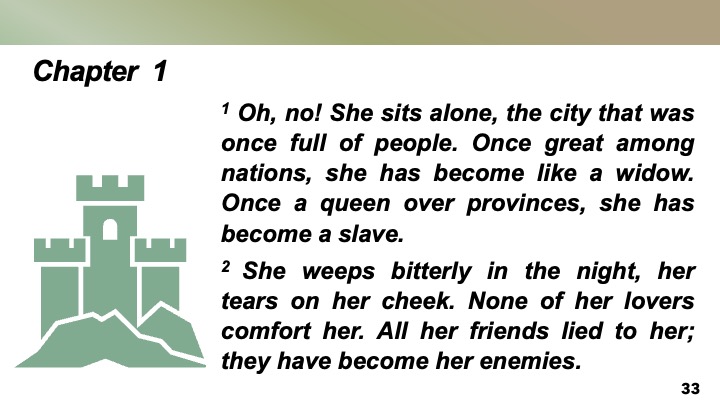
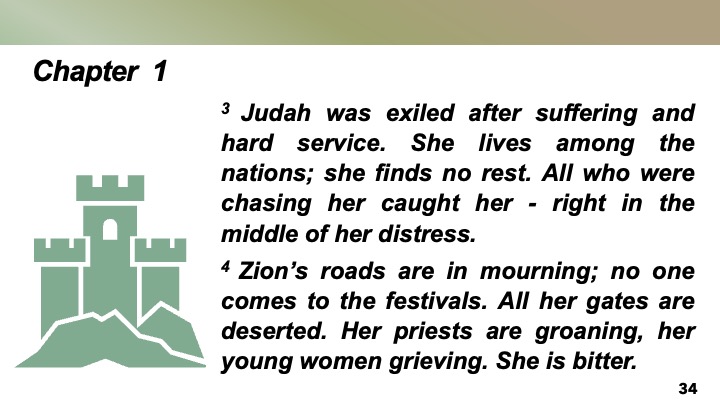
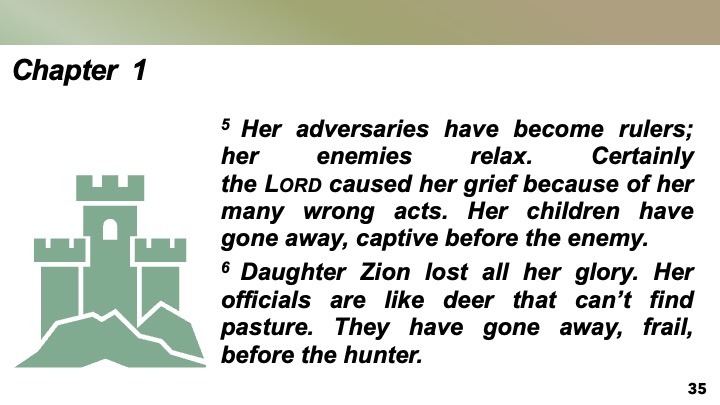
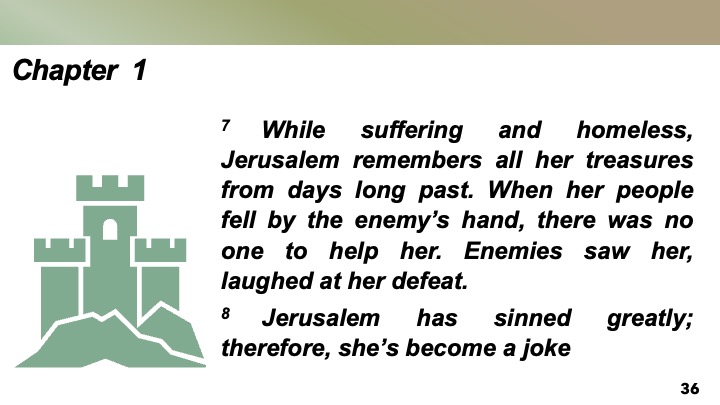
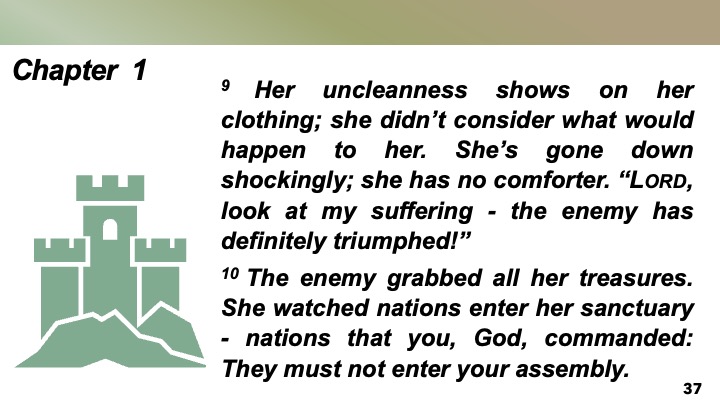
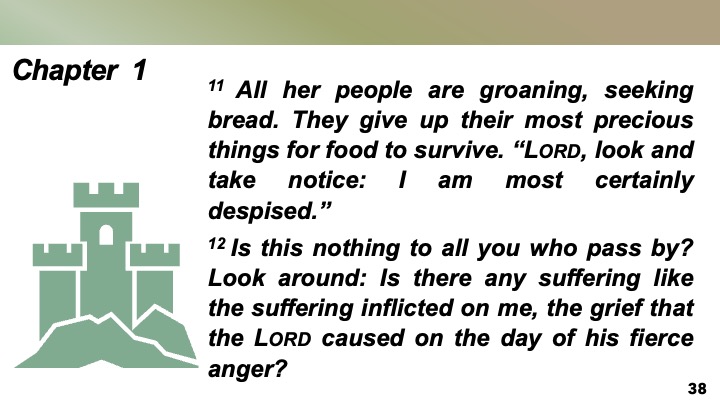
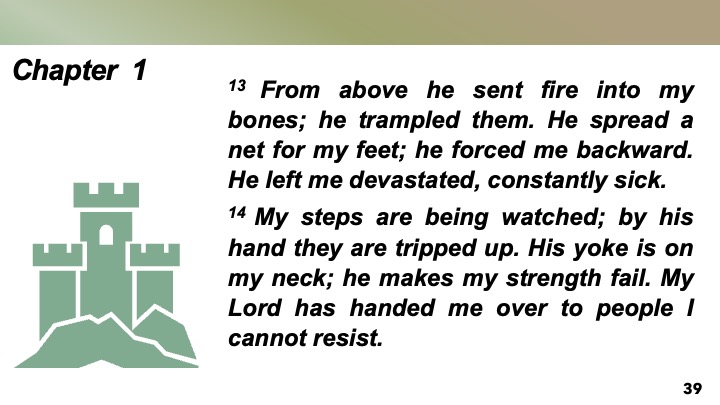
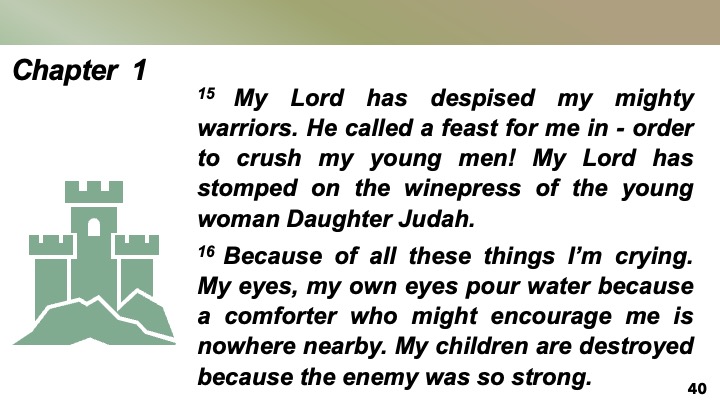
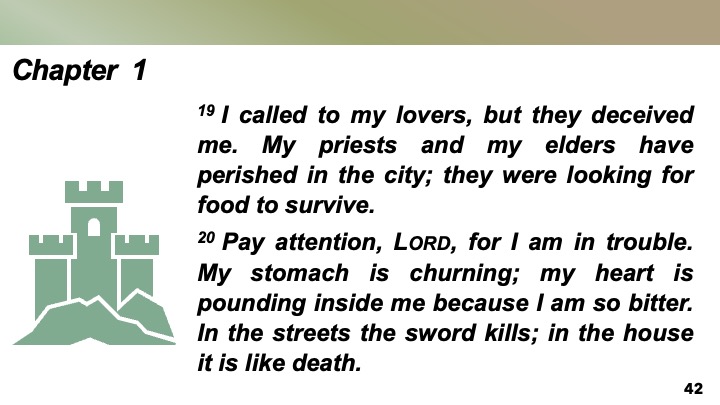
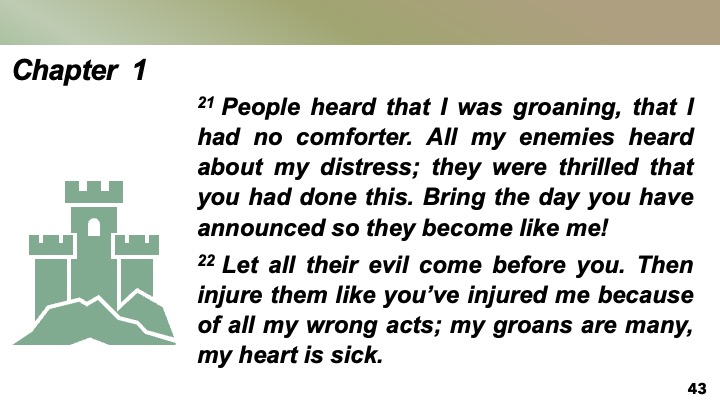
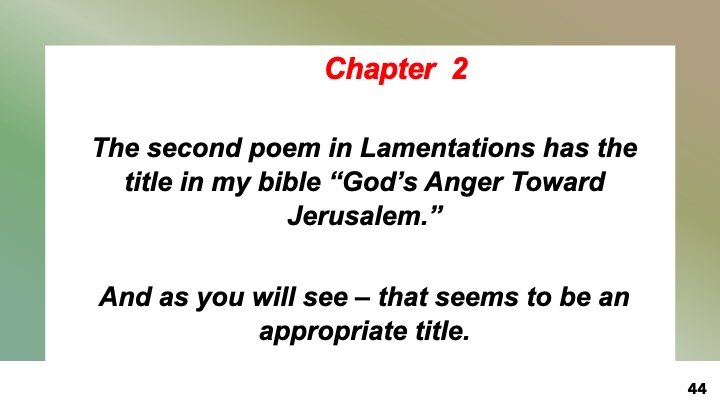
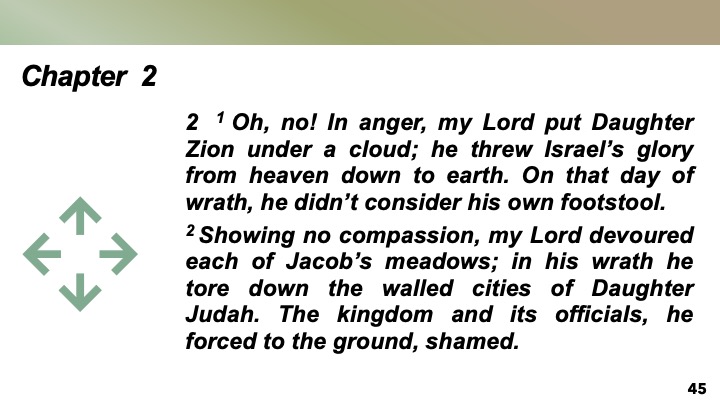
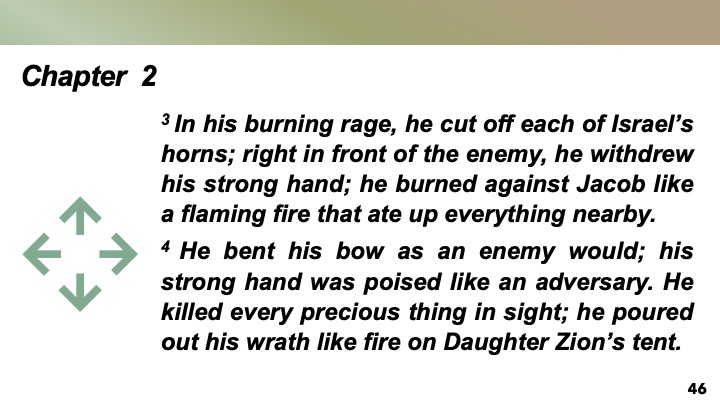
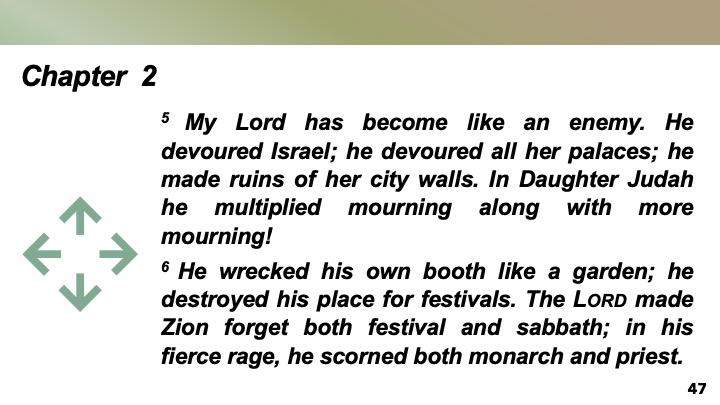
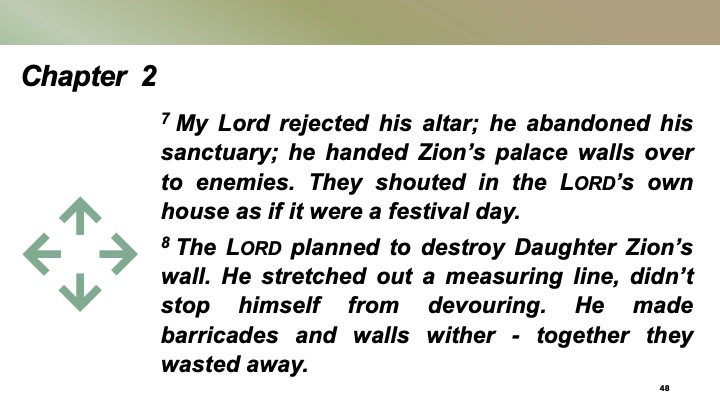
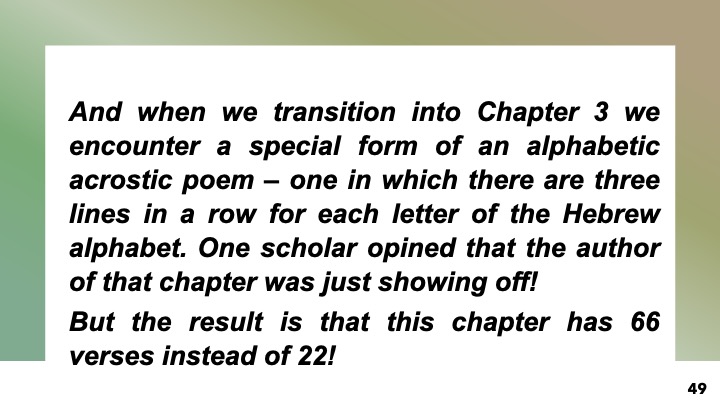
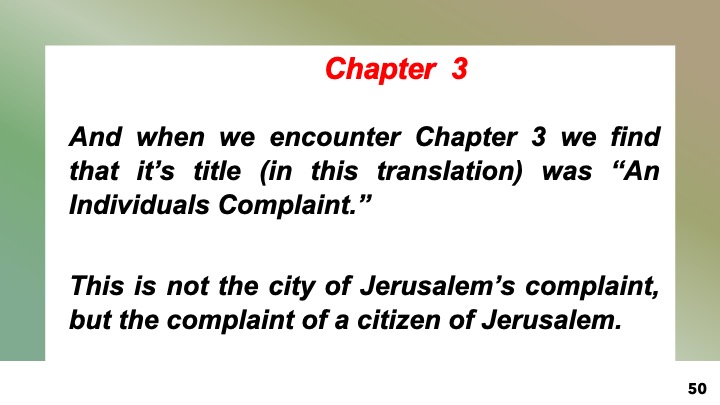
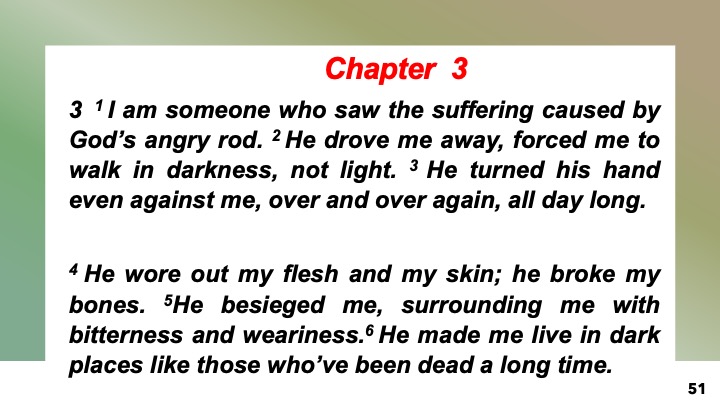
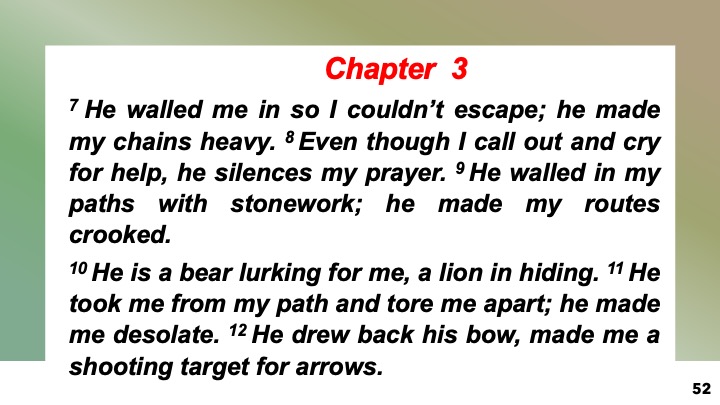
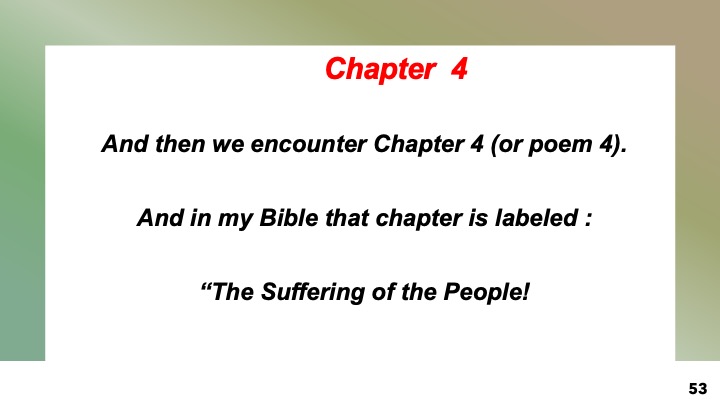
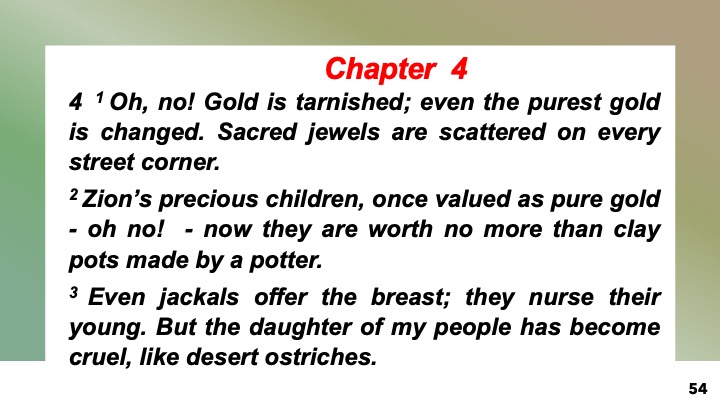
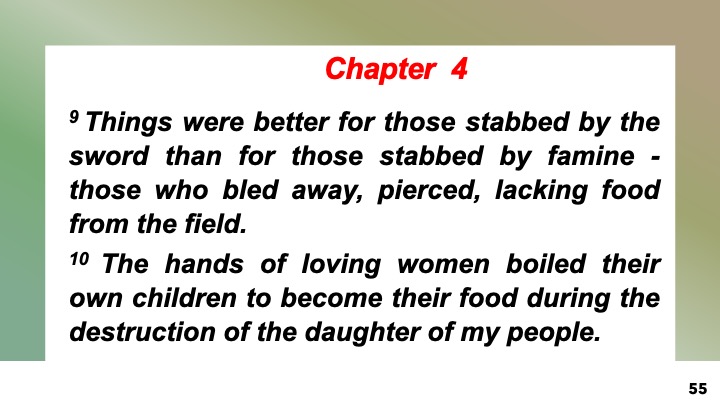
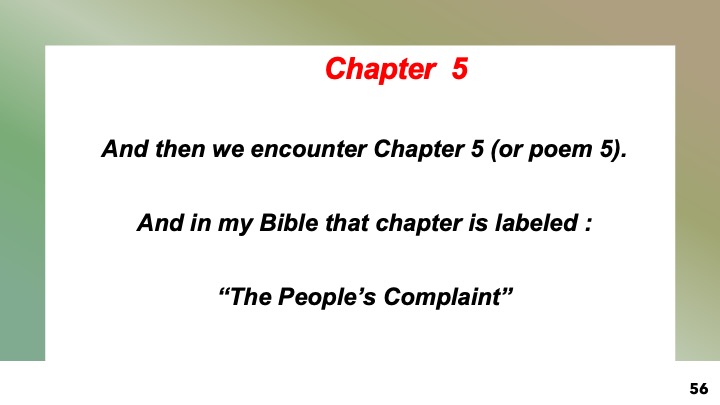
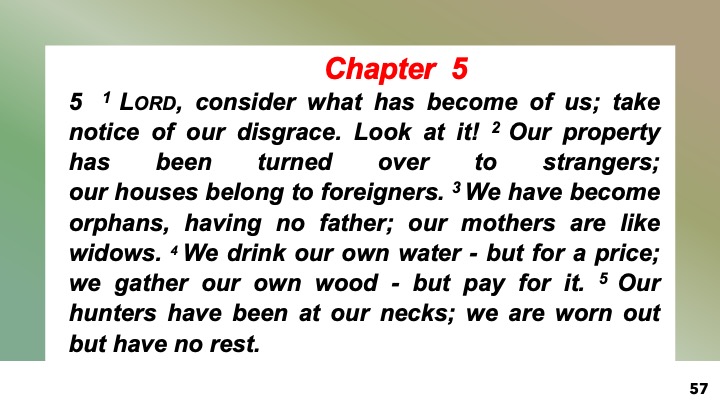
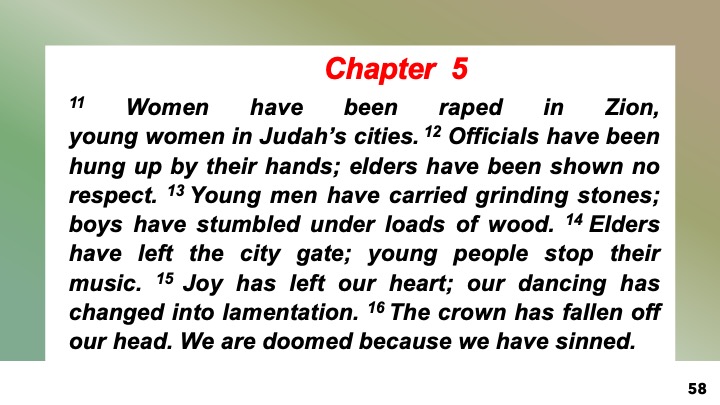
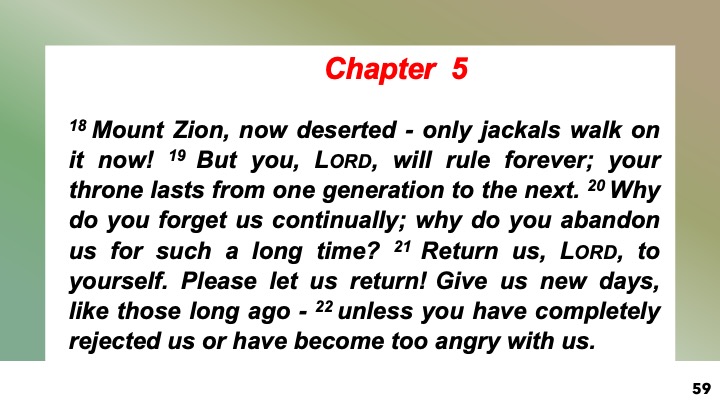
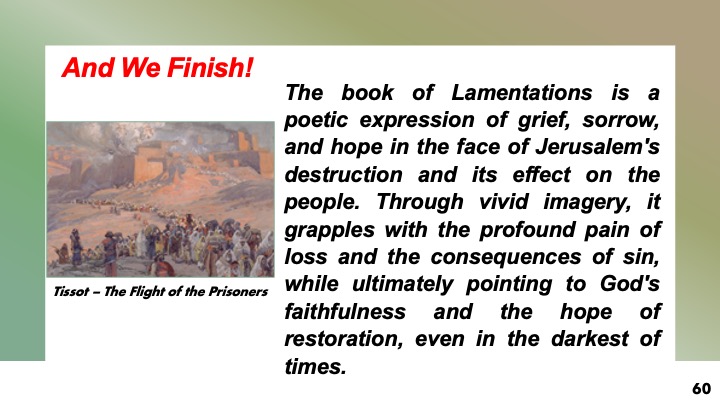
Examining the Book of Lamentations
Links
< Home Page > < Top of Page >
Examining the Book of Lamentations - the Text
Examining the Book of Lamentations – The Text
What is a Biblical Lament?
It has been estimated that almost a third of the Psalms and of course the entire book of Lamentations that we are about to consider are concerned with lament. Perhaps that is why it is called Lamentations? Maybe like every other emotion, God wants to hear about our pain.
And we know the world is broken. We see and experience sadness and sickness and agony every day. On the news, we see wars in foreign lands, stories of poverty and neglect, and a gunman killing 21 people at a school in Texas. Lament is often needed.
So How Can We Learn From Lament?
Well, we can read Lamentations. This often-avoided book of the Bible is (perhaps obviously) full of lament. Read it several times, slowly, to reap the benefits. We learn some things in Lamentations that we may not learn if we only read the Psalms - namely, that lament should often be corporate, not just individual, and that we can and should lament even when we are partially responsible for the pain and sorrow we experience.
Examining the Book of Lamenations
Introductory Material
Authorship
For a very long period the traditional assumption in both Judaism and Christianity was that Lamentations was written by Jeremiah.
But today modern scholarship does not accept that conclusion. A more current view is that the sentiments expressed in Lamentations do not coincide with those of Jeremiah.
In addition to the challenge related to the sentiments expressed, an additional issue in regard to authorship is the literary style employed which is significantly different to that of the book of Jeremiah.
This is the issue that the 4 of the 5 poems in Lamentations are alphabetical acrostic poems.
Type of Literature
Lamentations is five poems, contained in five chapters.
And the first four poems are alphabetic acrostics.
An acrostic poem is one in which the first letter of each verse is a letter from the Hebrew language in its alphabetic order.
Alphabetic acrostic poems are found in several places in the Hebrew Bible, particularly in the Book of Psalms and the Book of Lamentations. An acrostic poem is a type of poetry where each line or stanza begins with a successive letter of the alphabet. In the case of Hebrew alphabetic acrostics, each line or stanza starts with a successive letter of the Hebrew alphabet, which consists of 22 letters
Here are some examples of alphabetic acrostic poems in the Bible:
1. Psalms 9-10, 25, 34, 37, 111, 112, 119, and 145 2. Proverbs 31:10-31 3. Lamentations 1, 2, 3, and 4 alphabetic acrostics. 4. Lamentations 5 is not alphabetic but contains 22 verses.
This form serves several purposes:
1. It creates a sense of completeness, as the poet works through the entire alphabet.
2. It helps with memorization, as the structure provides a mnemonic device.
3. It demonstrates the poet's skill and creativity in working within a structured form.
4. In the case of Lamentations, it may also suggest that the writer is expressing grief and sorrow in a very orderly and comprehensive manner.
Historical Context
The destruction of Jerusalem and the First Temple by Nebuchadnezzar II in 586 BCE, followed by the deportation of a significant portion of the population to Babylon, was a catastrophic event for ancient Israel, financially, religiously, and emotionally.
Financially
The destruction of Jerusalem, the capital city, would have severely disrupted trade, commerce, and the overall economy of both the Kingdom of Judah and the Kingdom of Israel.
The deportation of skilled craftsmen, artisans, and the elite class to Babylon deprived the kingdoms of valuable human resources and expertise.
The loss of the Temple, which served as a central treasury, would have dealt a severe blow to the financial stability of the kingdoms.
The destruction of agricultural lands and the displacement of farmers would have led to a decrease in agricultural output and food security.
Religiously
The exile challenged the belief that Yahweh would always protect Jerusalem and the Temple, leading to a crisis of faith and identity.
The deportation and resettlement of Israelites in a foreign land exposed them to new religious and cultural influences, challenging their traditional beliefs and practices.
The destruction of the First Temple, believed to be the earthly dwelling place of Yahweh, was a profound theological and psychological shock to the Israelites.
The loss of the Temple, the center of religious life and ritual, left the Israelites without a place to perform their religious duties and connect with their God.
And Emotionally?
Hard to describe! The combination of the financial and religious aspects must have been profound.
The destruction of Jerusalem and the exile to Babylon was a watershed moment in the history of ancient Israel, with far-reaching consequences that reshaped the political, economic, and religious landscape of the region. It forced the Israelites to adapt to new circumstances and reinterpret their relationship with Yahweh, ultimately leading to the development of Judaism as a more portable and resilient faith.
Time of Composition
Most modern scholars tend to date the composition to the time before the return of the Jews from exile in 537/536 BCE. And because some of the comments appear to be almost eyewitness accounts of the destruction of Jerusalem that it may have been written a short time after that destruction.
The Major Themes
Much has been written about the major themes of this collection of laments.
We will briefly review one view of what each of those themes are:
First Theme
1. Lament and Grief:
As its name implies, Lamentations is a series of mournful songs that express profound grief and sorrow over the destruction of Jerusalem and its Temple. The author(s) give voice to the pain and suffering experienced by the people.
2 11 My eyes are worn out from weeping; my stomach is churning. My insides are poured on the ground because the daughter of my people is shattered, because children and babies are fainting in the city streets.
12 They say to their mothers, “Where are grain and wine?” while fainting like the wounded in the city streets, while their lives are draining away at their own mothers’ breasts.
3 48 Streams of water pour from my eyes because of the destruction of the daughter of my people. 49 My eyes flow and don’t stop. There is no relief 50 until the Lord looks down from the heavens and notices. 51 My eyes hurt me because of what’s happened to my city’s daughters.
Second Theme
2. God's Judgment:
Despite the emphasis on grief, the poems acknowledge that the disaster results from God's righteous punishment for the people's sin, particularly their idolatry and commitment to social injustice.
2 17The Lord did what he had planned. He accomplished the word that he had commanded long ago. He ripped down, showing no compassion. He made the enemy rejoice over you; he raised up your adversaries’ horn.
3 41 We should lift up our hearts and hands to God in heaven.
42 We are the ones who did wrong; we rebelled. But you, God, have not forgiven.
Third Theme
3. Suffering and Despair:
Graphic accounts of suffering and degradation dominate the book, such as starvation, cannibalism, the fall of the monarchy, and the loss of religious and cultural symbols like the temple and the king.
3 19 Get up and cry out at nighttime, at the start of the night shift; pour out your heart before my Lord like water. Lift your hands up to him for the life of your children - the ones who are fainting from hunger on every street corner.
20 Lord, look and see to whom you have done this! Should women eat their own offspring, their own beautiful babies? Should priest and prophet be killed in my Lord’s own sanctuary?
Fourth Theme
4. Hope and Reconciliation:
Amidst the lament and despair, there are intermittent pleas to God for mercy, forgiveness, and ultimately, restoration. The book portrays God as a God of justice, but also as a God of steadfast love and mercy.
3 22 Certainly the faithful love of the Lord hasn’t ended; certainly, God’s compassion isn’t through!
23 They are renewed every morning. Great is your faithfulness. 24 I think: The Lord is my portion! Therefore, I’ll wait for him.
Fifth Theme
5. The Power of Prayer: Lamentations underscores the importance of turning to God in prayer during times of extreme suffering and crisis. Despite the city's devastating state, the author represents prayer as a tool for healing and restoration.
3 55 I call on your name, Lord, from the depths of the pit.
56 Hear my voice. Don’t close your ear to my need for relief, to my cry for help.
57 Come near to me on the day I call to you. Say to me, “Don’t be afraid.”
And now, to better acquaint you with the experience of lament poetry we are going to read the first chapter of Lamentations together – remember it is just 22 sort verses.
In my bible Chapter 1 is entitled Jerusalem’s Suffering – meaning the suffering of the city itself. And as you know it is only 22 verses.
1 Oh, no! She sits alone, the city that was once full of people. Once great among nations, she has become like a widow. Once a queen over provinces, she has become a slave.
2 She weeps bitterly in the night, her tears on her cheek. None of her lovers comfort her. All her friends lied to her; they have become her enemies.
3 Judah was exiled after suffering and hard service. She lives among the nations; she finds no rest. All who were chasing her caught her - right in the middle of her distress.
4 Zion’s roads are in mourning; no one comes to the festivals. All her gates are deserted. Her priests are groaning, her young women grieving. She is bitter.
5 Her adversaries have become rulers; her enemies relax. Certainly the Lord caused her grief because of her many wrong acts. Her children have gone away, captive before the enemy.
6 Daughter Zion lost all her glory. Her officials are like deer that can’t find pasture. They have gone away, frail, before the hunter.
7 While suffering and homeless, Jerusalem remembers all her treasures from days long past. When her people fell by the enemy’s hand, there was no one to help her. Enemies saw her, laughed at her defeat.
8 Jerusalem has sinned greatly; therefore, she’s become a joke
9 Her uncleanness shows on her clothing; she didn’t consider what would happen to her. She’s gone down shockingly; she has no comforter. “Lord, look at my suffering - the enemy has definitely triumphed!”
10 The enemy grabbed all her treasures. She watched nations enter her sanctuary - nations that you, God, commanded: They must not enter your assembly.
11 All her people are groaning, seeking bread. They give up their most precious things for food to survive. “Lord, look and take notice: I am most certainly despised.”
12 Is this nothing to all you who pass by? Look around: Is there any suffering like the suffering inflicted on me, the grief that the Lord caused on the day of his fierce anger?
13 From above he sent fire into my bones; he trampled them. He spread a net for my feet; he forced me backward. He left me devastated, constantly sick.
14 My steps are being watched; by his hand they are tripped up. His yoke is on my neck; he makes my strength fail. My Lord has handed me over to people I cannot resist.
15 My Lord has despised my mighty warriors. He called a feast for me in - order to crush my young men! My Lord has stomped on the winepress of the young woman Daughter Judah.
16 Because of all these things I’m crying. My eyes, my own eyes pour water because a comforter who might encourage me is nowhere nearby. My children are destroyed because the enemy was so strong.
17 Zion spreads out her hands; she has no comforter. The Lord commanded Jacob’s enemies to surround him. Jerusalem is just a piece of garbage to them.
18 The Lord is right, because I disobeyed his word. Listen, all you people; look at my suffering. My young women and young men have gone away as prisoners.
19 I called to my lovers, but they deceived me. My priests and my elders have perished in the city; they were looking for food to survive.
20 Pay attention, Lord, for I am in trouble. My stomach is churning; my heart is pounding inside me because I am so bitter. In the streets the sword kills; in the house it is like death.
21 People heard that I was groaning, that I had no comforter. All my enemies heard about my distress; they were thrilled that you had done this. Bring the day you have announced so they become like me!
22 Let all their evil come before you. Then injure them like you’ve injured me because of all my wrong acts; my groans are many, my heart is sick.
Chapter 2
The second poem in Lamentations has the title in my bible “God’s Anger Toward Jerusalem.”
And as you will see – that seems to be an appropriate title.
2 1 Oh, no! In anger, my Lord put Daughter Zion under a cloud; he threw Israel’s glory from heaven down to earth. On that day of wrath, he didn’t consider his own footstool.
2 Showing no compassion, my Lord devoured each of Jacob’s meadows; in his wrath he tore down the walled cities of Daughter Judah. The kingdom and its officials, he forced to the ground, shamed.
3 In his burning rage, he cut off each of Israel’s horns; right in front of the enemy, he withdrew his strong hand; he burned against Jacob like a flaming fire that ate up everything nearby.
4 He bent his bow as an enemy would; his strong hand was poised like an adversary. He killed every precious thing in sight; he poured out his wrath like fire on Daughter Zion’s tent.
5 My Lord has become like an enemy. He devoured Israel; he devoured all her palaces; he made ruins of her city walls. In Daughter Judah he multiplied mourning along with more mourning!
6 He wrecked his own booth like a garden; he destroyed his place for festivals. The Lord made Zion forget both festival and sabbath; in his fierce rage, he scorned both monarch and priest.
Chapter 3
And when we transition into Chapter 3 we encounter a special form of an alphabetic acrostic poem – one in which there are three lines in a row for each letter of the Hebrew alphabet. One scholar opined that the author of that chapter was just showing off! But the result is that this chapter has 66 verses instead of 22!
And when we encounter Chapter 3 we find that it’s title (in this translation) was “An Individuals Complaint.”
This is not the city of Jerusalem’s complaint, but the complaint of a citizen of Jerusalem. Perhaps an eyewitness to the carnage.
3 1 I am someone who saw the suffering caused by God’s angry rod. 2 He drove me away, forced me to walk in darkness, not light. 3 He turned his hand even against me, over and over again, all day long.
4 He wore out my flesh and my skin; he broke my bones. 5He besieged me, surrounding me with bitterness and weariness.6 He made me live in dark places like those who’ve been dead a long time.
7 He walled me in so I couldn’t escape; he made my chains heavy. 8 Even though I call out and cry for help, he silences my prayer. 9 He walled in my paths with stonework; he made my routes crooked.
10 He is a bear lurking for me, a lion in hiding. 11 He took me from my path and tore me apart; he made me desolate. 12 He drew back his bow, made me a shooting target for arrows.
Chapter 4
And then we encounter Chapter 4 (or poem 4).
And in my Bible that chapter is labeled :
“The Suffering of the People!
4 1 Oh, no! Gold is tarnished; even the purest gold is changed. Sacred jewels are scattered on every street corner.
2 Zion’s precious children, once valued as pure gold - oh no! - now they are worth no more than clay pots made by a potter.
3 Even jackals offer the breast; they nurse their young. But the daughter of my people has become cruel, like desert ostriches.
Chapter 5
And then we encounter Chapter 5 (or poem 5).
And in my Bible that chapter is labeled :
“The People’s Complaint”
5 1 Lord, consider what has become of
us; take notice of our disgrace. Look at it! 2 Our property has
been turned over to strangers;
our houses belong to foreigners. 3 We have become orphans,
having no father; our mothers are like widows. 4 We drink our
own water - but for a price; we gather our own wood - but pay for it. 5 Our
hunters have been at our necks; we are worn out but have no rest.
11 Women have been raped in Zion, young women in Judah’s cities. 12 Officials have been hung up by their hands; elders have been shown no respect. 13 Young men have carried grinding stones; boys have stumbled under loads of wood. 14 Elders have left the city gate; young people stop their music. 15 Joy has left our heart; our dancing has changed into lamentation. 16 The crown has fallen off our head. We are doomed because we have sinned.
18 Mount Zion, now deserted - only jackals walk on it now! 19 But you, Lord, will rule forever; your throne lasts from one generation to the next. 20 Why do you forget us continually; why do you abandon us for such a long time? 21 Return us, Lord, to yourself. Please let us return! Give us new days, like those long ago - 22 unless you have completely rejected us or have become too angry with us.
And We Finish
The book of Lamentations is a poetic expression of grief, sorrow, and hope in the face of Jerusalem's destruction and its effect on the people. Through vivid imagery, it grapples with the profound pain of loss and the consequences of sin, while ultimately pointing to God's faithfulness and the hope of restoration, even in the darkest of times.